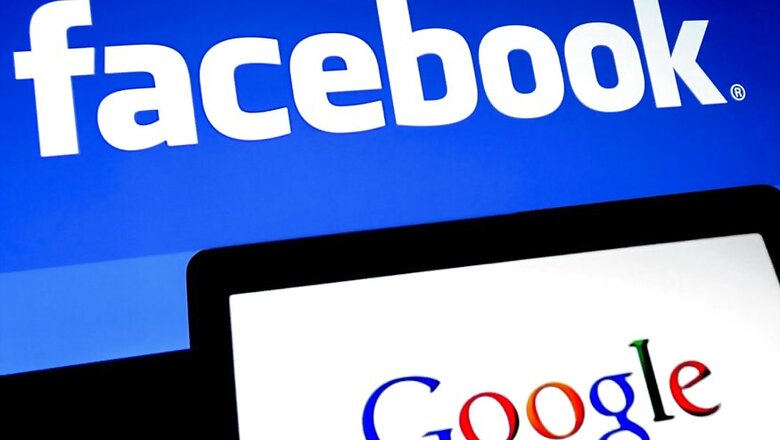
views
At 80, a mortally worried Michelangelo was frustrated with his creation Pieta, and in his mounting agony, he took a hammer and smashed his sculpture with great competence. Michelangelo was a towering genius of the Age of Reformation. Half a millennia down the line, ours is the Age of Technology and we have not one but many Michelangelos who have achieved unprecedented success with their monumental creations.
There is Google that drives us; there is Facebook that animates us; there is TikTok that entertains us; there is Amazon that satiates us; there is Instagram that titillates us; there is WhatsApp that stimulates us. The list is long. The Age of Technology has many gods, just like the Hindu pantheon, and each god rules his domain with unbridled ambition and unabashed arrogance.
When Gramsci, the Italian Marxist philosopher, talked of the concept of cultural hegemony, he had nation-states in mind. Had Gramsci a premonition that the Age of Technology would spawn a Zuckerberg, his theory of cultural hegemony would have left him seriously worried. Just like Michelangelo.
Zuckerberg’s Facebook is a hydra-headed hegemon that now rules the world with its mind-boggling algorithms that fuel toxic addiction. And Zuck’s creation has become such a big monster that sometimes even Zuck can’t control its pernicious tentacles. These tech giants, with their sinewy operations, not only control our bodies, but they—and this is where the gods of technology ditch their benevolence for belligerence—control our data.
In effect, they have a lock on our emotions: your swinging moods, your food passions, your nettlesome girlfriends, your irritating boyfriends, your breakups, your dalliances, your assignations, your anger, your tears—the entire bank of human data is now secreted away in faraway servers. And these companies, acting as meddlesome rent-seekers, plunder your data—read emotions—for bumping up their own profits.
The Age of Technology also had its Garden of Eden moment. Initially, when it started, everyone believed in the utopia it was selling. There were a few gods and they were benign. They promised deeper democratisation; they assured a levelling of opportunity; they spoke of a flattening of the inequality curve. And, within no time, it all devolved into, what Professor Shoshana Zuboff has said, “a rogue mutation of capitalism marked by concentrations of wealth, knowledge and power unprecedented in human history”. The benign gods had grown fangs and turned beastly.
For journalism, the Age of Technology was a harbinger of great things. It was like manna from a heaven that could be reached with just a click on the keyboard. A click connected Mirzapur with Midnapore and a swift scroll brought the glitz of Manhattan to dusty Malihabad. The gods building their algorithms were kind and allowed these magical transformations to happen seamlessly.
It was like suddenly coming from the hammer-and-chisel world of Michelangelo into the multi-splendour world of Marvel where superheroes flew around the world making amazing conquests. A conquest just took a click. Michelangelo banged away with his hammer for years in the Age of Reformation while the new Michelangelos clicked into new worlds and stamped them with their genius.
Journalism, considered by many as a public service, was enthralled initially, but, as technology grew its poisonous tentacles, it grew alarmed. Google and Facebook, their big thirst not slaked by human emotions, started devouring journalism. It started aggregating and disseminating news. In their continent like nations, Facebook and Google and their ilk behaved like classic authoritarians.
They grabbed the news menu and served it to their inhabitants with reckless abandon. They made space for an army of trolls to develop that had the worst instincts of Kim Jong-un. Good journalism soon got annihilated as the troll army rained its long-range missiles everywhere. And these weapons of mass destruction were built free and sent out with impunity to carpet-bomb and disembowel journalism. This was napalm bombing worse than Vietnam’s.
The Age of Technology has now moved into uglier realms. China, the worst authoritarian state in the world, is using face recognition technology to keep its restive Uighur population in check. It is also using the technology in Hong Kong, the city that’s protesting China’s devious attempts to curb its freedoms. Freedom was enshrined in the promise of technology, but, as the Age of Tech develops into a rapacious form of surveillance capitalism, it now is under attack everywhere.
What happens if America starts raining missiles on Libya? It easily grabs the headlines, which would leave other countries, with a Libya beef, sore. But these countries don’t have an arsenal of missiles. So what do they do to grab their share of the headlines? They piggyback the American missiles to make banner headlines. Journalism too, like these countries, rode the Google and Facebook missiles to profit from the headlines.
Many digital platforms, buffeted and left behind by these technology giants, started using search engine optimisation to game the system. The SEO model yoked SEO-driven content creation to their missile system, but unfortunately it was a useless ride to nowhere. The algorithms, unlike the missiles in Kubrick’s Dr Strangelove, didn’t follow any commands and went wherever they wanted to go.
In their quest to bend the algorithms, which were touted as free radicals but were actually fifth columnists, to their will, the digital platforms, some of them run by storied legacy brands, also joined the click-bait model of journalism. News was dumbed down to bullet points and salacious, eye-catching headlines were used to grab elusive eyeballs, which were anyway tired of the tripe floating on the Net.
The belligerent tech gods started capturing journalism’s territory with a swiftness that was unprecedented. Advertising already scarce shifted hook, line and tagline to these tech companies, leaving journalism with a revenue model that got hollowed out like the Bamiyan Buddhas. Many newspapers shut shop and many journalists just had pink slips in their pockets, which had been emptied by the new greed-is-good gods of technology. The ongoing pandemic has only made things worse.
Is there a way out of this mayhem? A solution that controls the always growing appetite of these tech gods? A light at the end of the tunnel? The Covid-19 crisis, just like 9/11, has only brought the government and gods of tech closer.
So, is the government capable of regulation? Of asking these companies to check their appetites. And, in some cases, even taking a hammer to them. EU’s Margrethe Vestager has shown spunk in taking on these giants. Australia recently has legislated asking Facebook and Google to share revenue with news platforms they crib from.
Google, under pressure from US regulators, has agreed to pay for content from select publishers. This unashamed parasitic behaviour, this great robbery has to stop for journalism to survive. Either these tech companies will have to be strictly regulated or they will have to be broken up so that they don’t become uncontrollable hegemons using their algorithms to wreak havoc on the world.
To check the grand ambitions of tech conquistadors, the world needs more saviours like Vestager or more creators, like Michelangelos, destroying their own works. Ideally, it would be good if both—the creator and regulator—use the chisel. Sparingly yet surely.

















Comments
0 comment